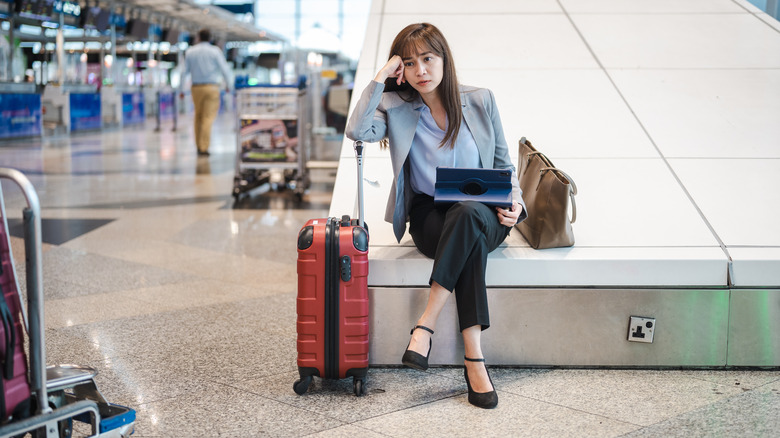Don't Let This Mistake Tempt You After A Long-Haul Flight
Surviving a long-haul flight is daunting, but the real challenge is actually in its aftermath. Jet lag, the nemesis of travelers everywhere, can be mitigated by a toolkit of tips that experts have long championed, including staying hydrated, limiting the consumption of diuretics like alcohol and coffee, and even taking a nice, long shower. But there's one more crucial tactic to beating jet lag that travelers often fail to do: resisting the lure of your bed, especially when it's still light out. As much as you want to dive into your mattress and cocoon yourself in your high thread-count bed sheets, giving in to the urge can only disrupt your adjustment process.
Laura Lindsay, a global travel trends expert at Skyscanner, explained to Thrillist that succumbing to sleep after a lengthy flight is doing your body a disservice. As it turns out, sleeping right away can only lead to prolonged exhaustion and sleepless nights. "It's so tempting to sink straight into bed after a long-haul flight, especially if you don't sleep well on planes. This can be a huge mistake. Your body will stick to its old rhythm, and you'll end up lying awake all night and feeling fatigued the next day," she explained. However, if you're struggling with overwhelming drowsiness, you can allow yourself to surrender to sleep — but only in brief bursts. "If you really have to snooze, keep it short — a two-hour nap is enough of a boost without destroying your chances of a good night's sleep."
Try to get some sunlight and move your body, too
Aside from trying your best to dodge sleeping after a long flight, it's also recommended you embrace sunlight and maybe even squeeze in some time for exercise. It may be tempting to stay within the confines of your room, but it's best to some spend time outside. In other words, soaking up the sun for as little as 15 to 30 minutes can already be a great help in syncing your circadian rhythm to a different schedule. "Exposing yourself to morning sunlight and evening sunlight will bump your sleep-wake cycle to the new time zone much faster," Robyn Youkilis, a health coach, told Business Insider.
While doing a workout can be unfathomable after hours in a cramped airplane seat, its impact on your body clock can be profound. "If you arrive in the morning, exercise as soon as possible to help to re-regulate your circadian rhythm and boost your energy," Lee Mullins, who works as a personal trainer, shared with British Vogue.
On the other hand, if you arrive at your destination at night, you're in luck. That's the only time you're encouraged to catch some Zzz's since it's already bedtime where you are anyway. If that's the case, don't be afraid to tailor your surroundings to your comfort so you can get to dreamland faster. This means adjusting the room temperature, slipping on an eye mask, fluffing up your pillows — basically, anything that allows for a more restful shuteye.

